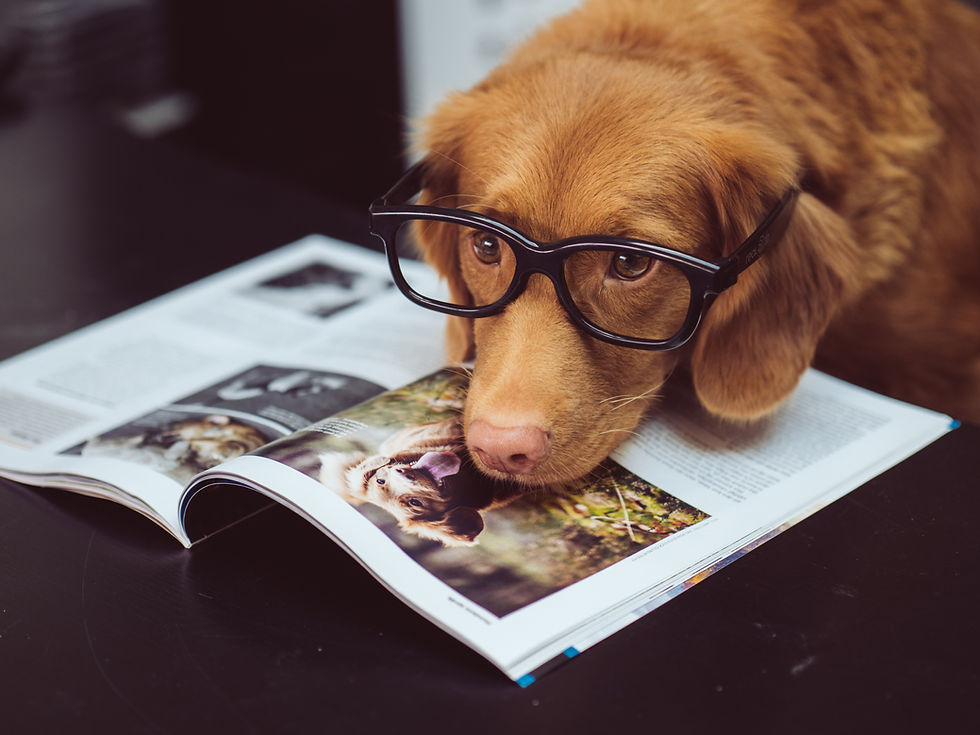One in three Australian women, and one in five Australian men live with anxiety.

At this point in the pandemic, causes for anxiety are only growing.
Sometimes it's a crushing certainty that something terrible will happen to the people I love. Sometimes it's unstoppable thoughts that rattle through my day, or loom in the middle of the night. Sometimes it's inexplicable shame.
Anxiety isn't 'curable' — management is a lifelong experiment in how to be OK.
There's no shortage of suggested resources to help manage it, and it's different for everyone. Over time, I've accepted it will probably always be present, and my management plan is pretty specific.
But recently, one coping mechanism has surprised me: pretending to be my dog on Instagram.
Eighteen months ago, my partner and I adopted a rescue dog named Phoebe.
She's an Australian bulldog with a wicked underbite and bucketloads of sass, but also bucketloads of love to give (as we do in return).
We adopted her as a six-year-old, and she came with plenty of her own inexplicable anxieties.
Getting to understand Phoebe's anxieties has been much like getting to know my own, but with more compassion — the negative self-talk is gone; I just want to learn to make things easier for Phoebe, who improves my days.
Every day we learn again how some circumstances might be stressful (big roads, other dogs, the memory of a possum); how some might be unexpectedly delightful (eggs! blankets! ears!) — and how we can all learn to be patient with the feelings that come and go for her.

How can pets improve your mental health?
The benefits of pet ownership are well documented, and pets "can have a health-protective effect".
They promote healthy routines: for those who struggle to care for themselves, dogs can be a great reminder that we all need exercise, regular meals, plenty of water, and play.
Pets provide a sense of purpose and companionship, which can particularly support mental health.
These benefits are so widely recognised that the Black Dog Institute are working with Bondi vet Lisa Chimes to include "pets on prescription" for their social prescription program.
Workshopping with professionals and people with lived experiences of mental ill-health, the program connects traditional mental health clinic interventions with prescriptions for "meaningful activities" and community resources including arts, bibliotherapy, gardening, cooking, and — importantly — pets
Black Dog researcher Katherine Boydell says this radical rethink can help "address the root causes" of mental health issues.

#Dogstagram: Low-stakes silliness
In the months after Phoebe's adoption, my partner started an Instagram account for the dog, trying to move the deluge of dog pictures from his own account to their own corner of the internet.
Now, we jointly operate that account (in collaboration with Phoebe, of course). We've joined a massive #dogstagram community, who maintain accounts and post in the voice of their dog.
#Dogstagram can go two ways.
There's a supercharged sponsorship route: the most popular 'pet influencers' have followers in the millions, and mountains of swag for their efforts. Part of #dogstagram is made up of accounts aspiring to reach those dizzying heights of pet stardom.
The other #dogstagram is markedly more wholesome: a large group of adults adore and pretend to be their pets.
Don't get me wrong — nobody believes the pets themselves are making the posts.
This suspension of disbelief and willingness to get deeply silly is exactly what makes #dogstagram so relaxing.
Phoebe's Instagram 'voice' has developed over time, and is full of DoggoLingo. She loves a 'treato', says 'yer' (your) and 'heckin' (very), and Tuesdays are #TongueOutTuesday. Her online persona is self-confident and intelligent. I say "she", but I mean "we".
What started as a place to funnel our dog pics has led to a safe corner of the internet, where failure is rewarded just as much as milestones — because dogs are often cute, even (especially) when they're failing.
I get to document my closeness and learning with Phoebe, and I also get to play. Essential to this whole thing is some very low-stakes silliness.
Crafting posts is only one joy of #dogstagram. Another is interacting with the #dogstagram community.
Other dog owners have taught us about enrichment and walking routes. I've developed relationships with other bulldog owners — I've even encountered other rescue dogs who so closely resemble Phoebe that we believe they might be related.

Images as therapy
Often social media feeds into anxious thought patterns, with its push toward comparisons, external validation, and the presentation of life's highlights reel.
However, playfulness online is a less researched area. With mental illnesses often becoming apparent in young adulthood, the audience using Instagram are exactly the people who might embrace online play or mindfulness as a coping mechanism.
Ms Boydell leads part of the Black Dog Institute's social prescription program. A recent trial of 'art on prescription' saw "significant increases in mental health and wellbeing, significant increases in perceptions of community inclusion".
Art here is defined in the broadest terms — including digital media — as a way to communicate lived experience.
Engaging with art as a community activity impacts both the individual's relationship with their own mental health, but also their social connectedness, drawing benefits from being part of a group.
Reflecting on the importance of art in staying connected during the isolation period of the coronavirus pandemic, Ms Boydell expects to see a "relationship between positive coping strategies and relying on creative, artful activities".
"In every way — whether it's creating yourself, engaging in viewing others create, or in looking at others' creations."
At a time when isolation is a necessity, interactions at a distance through platforms like #dogstagram can help us deal with loneliness and anxiety.
And it's a heckin' treato for yer brain.
Comments